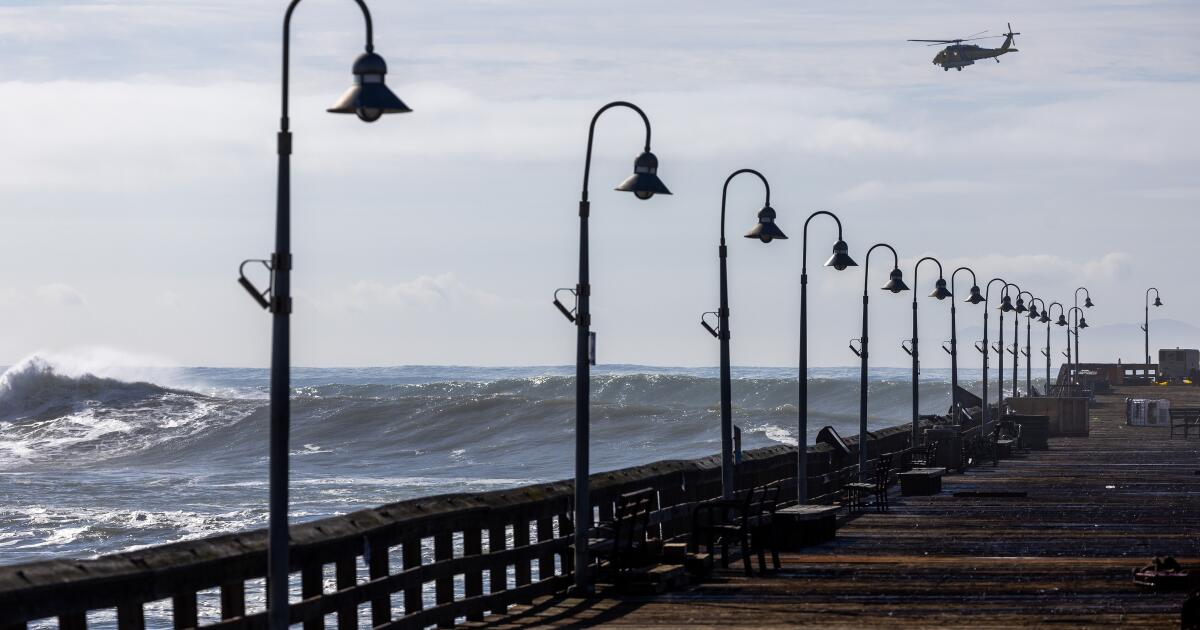Business
UK inflation hits target for first time in almost three years

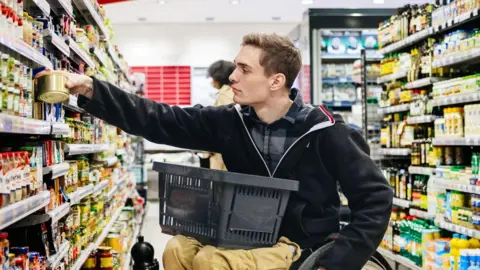 Getty Images
Getty ImagesInflation has hit the Bank of England’s target for the first time in almost three years.
Prices rose at 2% in the year to May, down from 2.3% the month before, official figures show.
The economy is a key talking point in the run-up to the general election on 4 July, with all of the main parties battling over how they would keep the cost of living under control.
The Conservatives said their “difficult decisions” were paying off, but Labour said pressures on family finances were “still acute”.
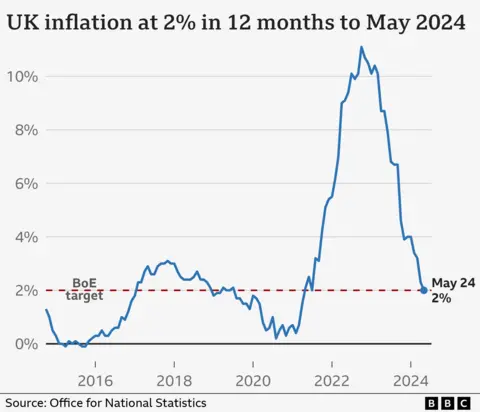
The drop in May’s inflation figure was driven by a slight fall in prices for food and soft drinks, and slower price rises for recreation and culture and furniture and household goods.
However, petrol prices are rising again, and food prices are still 25% higher than at the beginning of 2022.
The inflation figure comes ahead of the Bank of England’s latest decision on UK interest rates this Thursday.
The bank is expected to hold the rate at 5.25% – a 16-year high – for the seventh meeting in a row.
Due to stubbornly high price rises in the services sector, markets are not betting on a rate cut before September.
Inflation has fallen steadily since October 2022, when Russia’s invasion of Ukraine caused it to peak at 11.1% as food and fuel prices soared.
But millions of households are still struggling with the cost of living.
Even though inflation is falling, it does not mean the prices of goods and services overall are coming down, just that they are rising at a slower pace.
The Bank of England has also put up interest rates to try to dampen down consumer demand, driving up mortgage rates and rents.
Offical figures on renting – also released on Wednesday – showed average rents paid to private landlords in the UK rose by 8.7% in the year to June.
Meanwhile, even with the inflation rate falling, mortgage rates remain stubbornly high as lenders wait for the Bank of England’s next and subsequent moves on interest rates.
‘You can’t pass all costs on to customers’
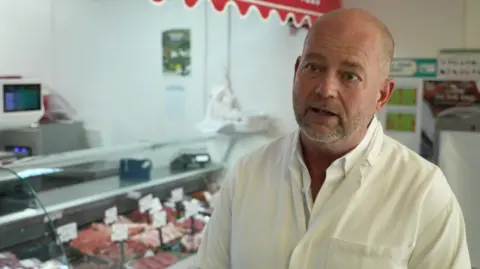
Gary Wildman, the owner of John Wildman & Sons butchers, told the BBC he had seen price rises levelling out at the store he started with his dad 31 years ago in Rustington, West Sussex.
“Prices are probably 10 to 15% more than they were at the beginning of Covid, but they are level now, definitely,” he told the BBC.
However, he said some products such as pork were still going up while the shop’s energy bills were higher than a few years ago.
“You do take a hit to your margins,” he said. “You can’t pass all costs on to customers or the customers wouldn’t come in.”
May’s inflation figure is the last big official economic statistic before the general election and has sparked significant debate among the main parties.
The Conservatives claim the figures back up their story of an economic turnaround – although the question for them politically is whether they get any credit for the fall.
Parties battle over cost of living
Chancellor Jeremy Hunt said the UK’s inflation rate was now lower than “nearly all” major economies.
“That would not have happened under Labour that refused to condemn the public sector pay strikes, that would have meant inflationary pay rises, inflation lasting longer,” he added.
But Labour continue to press concerns about an ongoing cost of living crisis.
Rachel Reeves, Labour’s shadow chancellor, told the BBC: “Unlike Conservative ministers, I’m not going to tell people that everything’s fine.
“I know that the cost of living crisis is still acute, that even though inflation is falling, it doesn’t mean the prices are coming down, they’re just rising at a less fast rate.”
Liberal Democrat Treasury spokeswoman Sarah Olney said millions of people wouldn’t be feeling any better off.
“Rishi Sunak’s boasts will ring hollow to countless families seeing their mortgages skyrocket and agonising rises in shopping prices compared to just a few years ago.”
Attempts by politicians to apportion blame for high inflation, or claim credit for it falling, should be treated with caution.
The soaring cost of living was mainly driven by the pandemic and Russia’s war in Ukraine which drove up global commodity prices.
Meanwhile, falling inflation was largely due to declining wholesale energy and food prices, along with 14 rate hikes by the Bank of England.
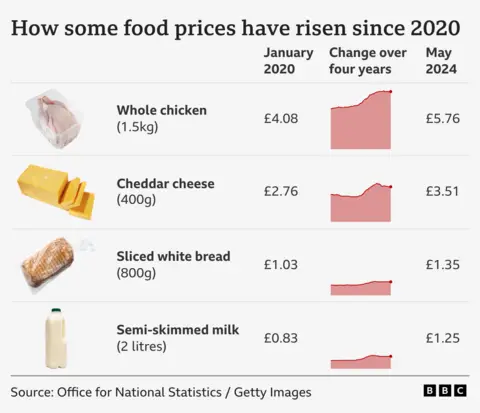
UK inflation is now rising at its slowest pace since July 2021.
It is also lower than in the eurozone and the US, where rates were 2.6% and 3.3% in May respectively.
However, the UK is not out of the woods yet, with price rises in the services sector still high.
Yael Selfin, chief economist at KPMG UK, said services inflation was still “uncomfortably high” and the Bank would need to see a continued fall before cutting rates.
David Bharier, head of research at lobby group the British Chambers of Commerce, said May’s inflation figure provided “additional weight for an interest rate cut in the coming months”.
Business
Saudi Arabia’s net foreign direct investment rises 5.6% in first quarter By Reuters

DUBAI (Reuters) – Net foreign direct investment (FDI) inflows to Saudi Arabia rose 5.6% to 9.5 billion riyals ($2.53 billion) in the first quarter of 2024, government data showed on Sunday.
Inflows were up 0.6% to 17 billion riyals in the first three months compared with a year earlier, while outflows fell by 5.1% to about 7.5 billion riyals.
The kingdom hopes to attract $100 billion in FDI by 2030 to boost non-oil gross domestic product as part of a wider strategy by de facto ruler Crown Prince Mohammed bin Salman to diversify the economy away from its reliance on exports.
Earlier this month, over half of the shares offered under Saudi Aramco (TADAWUL:)’s $11.2 billion secondary share sale were sold to foreign investors.
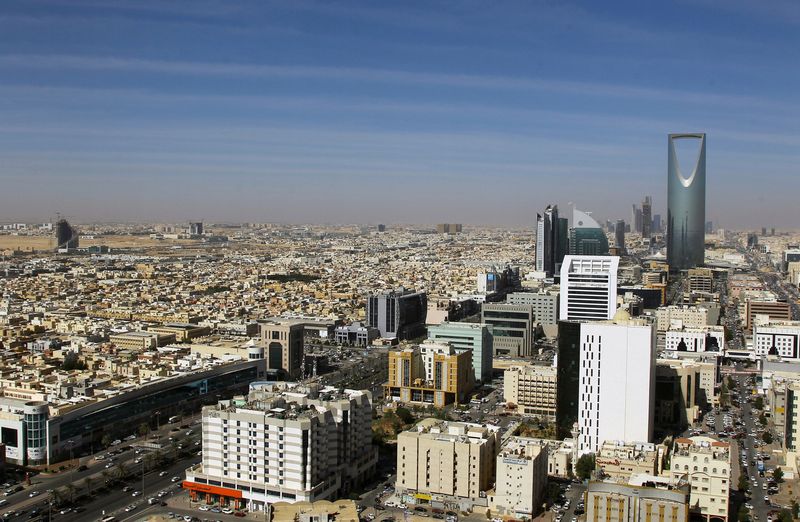
The oil giant has also helped lift FDI previously, but even with those deals FDI remained far from the 2030 goal, peaking at $32.8 billion in 2022 and reaching $19.2 billion last year.
($1 = 3.7516 riyals)
Business
The big problem facing whoever wins the election

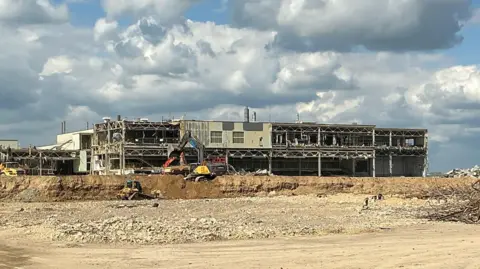 Getty Images
Getty Images Amid a vast expanse of rubble, dust and noise, a green crane yanks away at a corrugated roof like a frustrated dentist attempting to extract a particularly stubborn wisdom tooth.
Swindon’s Honda factory – once one of the world’s most advanced car factories – is being demolished, three decades after it opened.
This used to be one of the fastest-growing towns in Europe. It was one of the jewels in the crown of investments attracted to the UK by Margaret Thatcher’s brand of 1980s enterprise. Swindon voted for her, John Major, Tony Blair, David Cameron, Theresa May and Boris Johnson. It was also one of the first towns to declare for Brexit, by 55%.
But last year, its council changed hands to Labour. The council has had to continue to accelerate cuts to local services, passing a budget with record cuts in order to stave off bankruptcy.
Inflation, rising care expenses, and central government grant squeezes meant cuts to libraries, the Dial-a-Ride community transport service and dimmed street lights. There has been an almost 5% rise in council tax. The council leader has warned any further cuts will affect frontline services.
What is happening in Swindon is a visible consequence of sluggish long-term economic growth. Government spending cuts, low private investment, deindustrialisation and shrinking disposable income have left scars even on what was one of the UK’s famous boom towns.
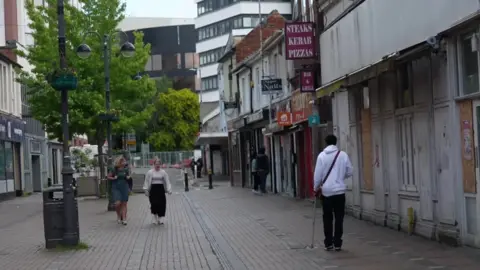
The Honda site is set to become a warehousing and logistics facility. In another world, it would have been replaced by another major global manufacturer. Tesla, for example, was invited. Whereas five years ago the promise was to level up left-behind Northern towns, places like Swindon feel levelled down.
The question about growth arising in this town is vital to whoever wins Thursday’s election.
Elsewhere in the world, sites like this are being repurposed for electric car manufacturing. The Americans are pouring public money into their factories to try to compete with China, who will soon be confirmed as the world’s biggest car exporter. Emerging economies from Indonesia to Vietnam to Turkey are also investing in and growing their car industries.
Indeed it was to Turkey that the entire Honda production line, including dozens of never-used industrial robots, was packed up and shipped off via the M4 and Bristol port last year.
Swindon is not just about Honda. It is part of the M4 corridor where there are plenty of jobs in the knowledge sectors, and in finance, for example at the headquarters of Nationwide. The overall unemployment rate is just 2.6%, but the number of people not in work and not looking for work is 18%.
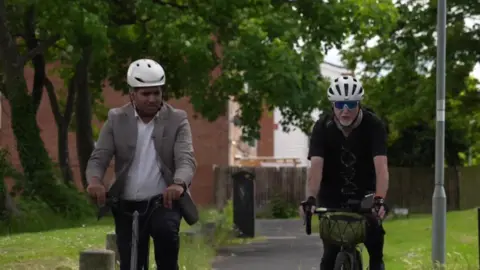
Marcus Kittridge, a former Honda engineer who now runs a cafe in the centre of town with his wife Tracey, accepts there are still “good employment prospects” but says many are at or “50p above” minimum wage, and says this has contributed to a decline in disposable income in the centre of town. “It’s like a Northern town that lost its industry in the 1970s,” he tells me.
They now shut the cafe at 14:00 every day because of the high price of energy. He expects to be passing on his rising costs in higher prices for the next year or two. They have also stopped selling smoothies, after a notable decline in the availability and quality of fresh fruit, which they blame on post-Brexit changes.
“We were told the quality of food was going to go up after Brexit, I can tell you now it has not. I’ve barely heard any politician mention it, but it definitely has had an impact on us,” Tracey says.
Might she have been a bit unlucky with her purchases of fresh produce? “If I’m unlucky, I’m getting unlucky every single day and I’m probably the unluckiest person on earth,” she says.
Their experience shows that some of the undercurrents of sluggish long-term growth – high energy prices, low disposable income, low investment, and new trade barriers can combine in unusual ways.
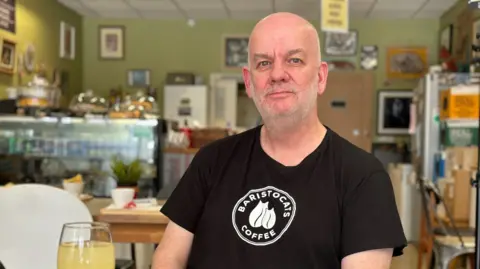
Gary Huett, a retired graphic designer also from Swindon who got in touch as part of the BBC’s Your Voice, Your Vote project inviting you to tell us what matters, wanted to know why Swindon’s town centre looked like it was “rotting” and asked if anything could change.
“We’ve now got pound shops predominantly, and the thriving night scene, packed with the yuppy set in the 1980s and 1990s has gone and decayed.”
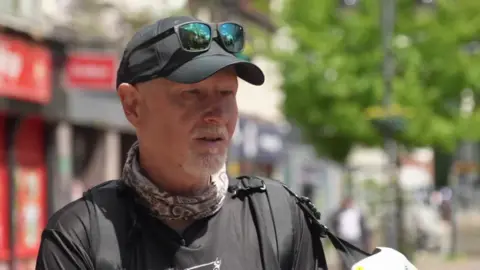
The Conservatives say green shoots are already here. The latest growth figures for January to March show the UK now has the fastest growing economy in the G7 group of advanced economies, after last year’s brief recession. Swindon’s jobs record remains strong. On the Honda site, new investment has come, and the jobs, albeit in warehousing rather than manufacturing, will return.
For Labour, Swindon – a bellwether town where residents have voted the same way as the eventual national winner for the last 40 years – shows that there are no quick fixes.
They are not competing with the US or European Union (EU) with big public investments in green energy. Council spending remains unprotected and subject to the same ongoing squeeze. A looser planning regime might help build more houses or expand the solar farms that dot the countryside around the town. But the job of transformation is very real. When asked what will happen if the economy does not grow, Labour has responded by saying some variation of “I’m not defeatist” or “we can do it”.
When I interviewed shadow chancellor Rachel Reeves in Swindon, I said that if she was relying on planning changes to transform growth prospects, they were going to have to be a revolutionary, almost Thatcher-style “Big Bang”. She told me: “It’s big reform we are offering… unless we grow the economy we’re going to be stuck in a doom loop of low growth, high taxes and poor public services.”
Labour’s hope is that there is a tsunami of private investment that has been held back from this country due to political and economic instability. That, the party says, can be unleashed by the tens of billions with a strong and stable pro-growth government.
When I met Chancellor Jeremy Hunt on the same day in Surrey, he said the party’s focus was now on bringing tax – which his party had hiked to seven-decade highs – down.
“We put up taxes because we were helping families in the cost-of-living crisis. We were very honest about that, it was the right thing to do.
“The difference is we don’t think it has to be permanent, and we are prepared to do the hard work to bring taxes down because we know a more competitive economy will see more growth and then more money for the NHS and schools.”
Whoever is in Number 11 after the election, Swindon shows the massive task facing them.
It shows what an economy not growing at normal rates looks like. A former boom town struggling. The challenge is not just to deliver robust economic growth here and well beyond, but to make sure this renewal is visible to the likes of Gary, Tracey and Marcus here in Swindon and to others like them across the country.
You can find a full list of candidates for the Swindon North constituency here, and those for the Swindon South constituency here.
Business
The $4.7 billion ruling against the NFL could shift power between the league and teams


The NFL has rarely been a loser on the field, but a lopsided blowout in an antitrust lawsuit could change how the world’s richest sports league generates and distributes billions of dollars in revenue every year.
A Los Angeles jury on Thursday sided with fans who claimed the league conspired with DirecTV to raise the price of subscriptions to watch games broadcast out of their team’s home market. The $4.7 billion in damages could be tripled under federal law.
That doesn’t mean the game is over.
The judge could potentially slash the verdict or even throw it out entirely and rule in the NFL’s favor. He didn’t look favorably on the fans’ arguments during the trial, and he dismissed the case back in 2019 before it turned into a class action. Post trial motions are set for July 31.
“It’s a real serious problem, but there’s a long way to go,” said Patrick Crakes, a media consultant and former Fox Sports executive who helped to negotiate the network’s deals with the NFL. “As far as the bigger picture goes and the NFL’s place in the media landscape and their value, it’s not going to stop them. They are going to keep rolling on.”
If the verdict stands, the NFL said it will appeal all the way to the Supreme Court, prolonging a case that dates back to 2015. The Mucky Duck bar in San Francisco filed the original lawsuit, arguing that the NFL’s Sunday Ticket forced viewers to pay for out-of-market games even when their team wasn’t playing — and charged high prices for it. In other words, as a fan you must buy the rights to every game on a Sunday, not just when your team plays.
The jury took less than a day of deliberations to decide that was unfair. The verdict is a shock to how sports are offered to consumers, and a major blow to the NFL, so used to having the Midas touch. Even though it will appeal, the league has to plan for the potential costs of losing.
It’s hard to know how much cash the NFL has. As a private company, it doesn’t share its finances. Back in 2010, NFL Commissioner Roger Goodell set a revenue target of $25 billion by 2027.
Right now, one way to estimate the NFL’s revenue puts it at about $12 billion, according to the annual statement of the Green Bay Packers, the only NFL team that publishes its finances. Each of the 32 teams get the same amount from the NFL, and the Packers got $374.4 million in 2022, the last available figures.
FIFA, the world soccer body, is the only other sports organization that competes with the NFL in terms of money, at least during a World Cup year. It made over $6 billion from the Qatar World Cup in 2022. It has about $4 billion in cash reserves.
If FIFA has that much cash, you can assume that the NFL at least has the ability to save up and pay the verdict, but it will take some time. So will the appeal.
Power Shift
The next issue – assuming the verdict isn’t overturned — could be a power shift between the NFL and its teams.
The NFL has kept its members happy by signing massive TV deals that makes everyone rich. The NFL will get $110 billion from its 11-year TV deal signed in 2021.
The NFL has always been special. In 1961, congress passed the Sports Broadcasting Act, after a US district court ruled the NFL was breaking antitrust rules by pooling rights in a deal with CBS.
The Act allowed the NFL to bundle all the teams’ rights together to make the league economically viable. But the Act focused on broadcast deals, while the Mucky Duck lawsuit focused on whether the NFL broke antitrust laws with the Sunday Ticket package offered by DirecTV, a satellite provider.
If the verdict stands, teams could be granted the opportunity to sell their local rights and out-of-market games on cable or even a streaming service. The temptation could be strengthened if the NFL tried to pass on the cost of the fine to each team — a potential hit that could be anywhere from $150 million to $450 million.
“Ultimately, it’s a free market, and the hope is that it will create more opportunity for people to view the NFL product,” said Sarah Hartley, a sports law lecturer at the University of Virginia School of Law and a partner at Bryan Cave Leighton Paisner. But she also cautioned that legal process is far from over.
YouTube
Starting in 2023, YouTube replaced DirecTV as the home of Sunday Ticket. It pays the NFL $2 billion a year and it charges customers $349. Even though the case didn’t involve YouTube, it’s hard to tell if the streaming platform will be better off giving more money to a team with a bigger fan base, and viewers. It’s also hard to know whether team owner thinks they can strike a better deal on their own.
Dallas Cowboys owner Jerry Jones admitted as much during the trial. “I’m convinced I would make a lot more money than the Bengals,” he said on the stand. It got some laughs.
Jones is arguably the architect for the NFL being funded by TV revenues. Back in 1992, CBS and NBC actually lost money on NFL broadcasts. The NFL broadcast committee wanted to give the networks millions in rebates. Jones said no, brought in a new network called Fox, and started a bidding war.
When Jones fought back against the rebate, he was a new owner after buying the Cowboys in 1989 for $140 million. It’s now worth billions. There are now new owners looking to make their own mark.
-

 African History5 years ago
African History5 years agoA Closer Look: Afro-Mexicans 🇲🇽
-

 African History5 months ago
African History5 months agoBlack History Facts I had to Learn on My Own pt.6 📜
-

 African History5 years ago
African History5 years agoA Closer Look: Afro-Mexicans 🇲🇽
-

 African History1 year ago
African History1 year agoMajor African Tribes taken away during the Atlantic Slave Trade🌍 #slavetrade #africanamericanhistory
-

 African History1 year ago
African History1 year agoPROOF AFRICAN AMERICANS AIN'T FROM AFRICA DOCUMENTED EVIDENCE
-

 African History1 year ago
African History1 year agoCameroon 🇨🇲 World Cup History (1962-2022) #football #realmadrid #shorts
-

 African History5 months ago
African History5 months agoBlack History Inventors: Mary Kenner 🩸
-

 African History4 months ago
African History4 months agoMr Incredible Becoming Canny/Uncanny Mapping (You live in Paraguay 🇵🇾)












